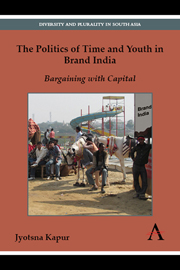Book contents
- Frontmatter
- Dedication
- Contents
- Acknowledgments
- Introduction: After Me the Flood
- Chapter 1 Brand India's Biggest Sale: The Cultural Politics and Political Economy of India's “Global Generation”
- Chapter 2 Arrested Development and the Making of a Neoliberal State
- Chapter 3 For Some Dreams a Lifetime is Not Enough: The Rasa Aesthetic and the Everyday in Neoliberalism
- Chapter 4 An “Arranged Love” Marriage: India's Neoliberal Turn and the Bollywood Wedding Culture Industry
- Chapter 5 Ek Haseenah Thi (There Once Was a Maiden): The Vanishing Middle Class and Other Neoliberal Thrills
- Conclusion
- Notes
- References
- Index
Chapter 3 - For Some Dreams a Lifetime is Not Enough: The Rasa Aesthetic and the Everyday in Neoliberalism
Published online by Cambridge University Press: 05 March 2014
- Frontmatter
- Dedication
- Contents
- Acknowledgments
- Introduction: After Me the Flood
- Chapter 1 Brand India's Biggest Sale: The Cultural Politics and Political Economy of India's “Global Generation”
- Chapter 2 Arrested Development and the Making of a Neoliberal State
- Chapter 3 For Some Dreams a Lifetime is Not Enough: The Rasa Aesthetic and the Everyday in Neoliberalism
- Chapter 4 An “Arranged Love” Marriage: India's Neoliberal Turn and the Bollywood Wedding Culture Industry
- Chapter 5 Ek Haseenah Thi (There Once Was a Maiden): The Vanishing Middle Class and Other Neoliberal Thrills
- Conclusion
- Notes
- References
- Index
Summary
A recent Hindi film dialogue that has caught the popular imagination goes something like this: “If it is not happy, then it cannot be the end. The film has yet to be continued, my friend.” The refrain runs through Om Shanti Om (Khan et al. 2007), a film whose tagline, “For some dreams a lifetime is not enough,” indicates that the end may be postponed even beyond a lifetime. Om Shanti Om's circuitous plot celebrates a love-affair with cinema over two generations and lifetimes. The film's protagonist Om, played by the current reigning star Shah Rukh Khan, is cast as a lowly film-extra in the 1970s who hopes, one day, to be a big star and win the love of the leading female star of the period. He eventually fulfills both those dreams — but in another lifetime. Reborn as the son of a major star, Khan is reincarnated as the leading star of the new century. The narrative, thus, puts its finger on one of the most distinctive pleasures of Hindi cinema, that is, the promise of a happy ending while simultaneously postponing it. It would not be far-fetched to say that, if only it were possible to do so, Hindi cinema would indefinitely postpone the appearance of “The End.”
“The film has yet to reach its end,” has now passed on into everyday expression.
- Type
- Chapter
- Information
- The Politics of Time and Youth in Brand IndiaBargaining with Capital, pp. 73 - 92Publisher: Anthem PressPrint publication year: 2013



